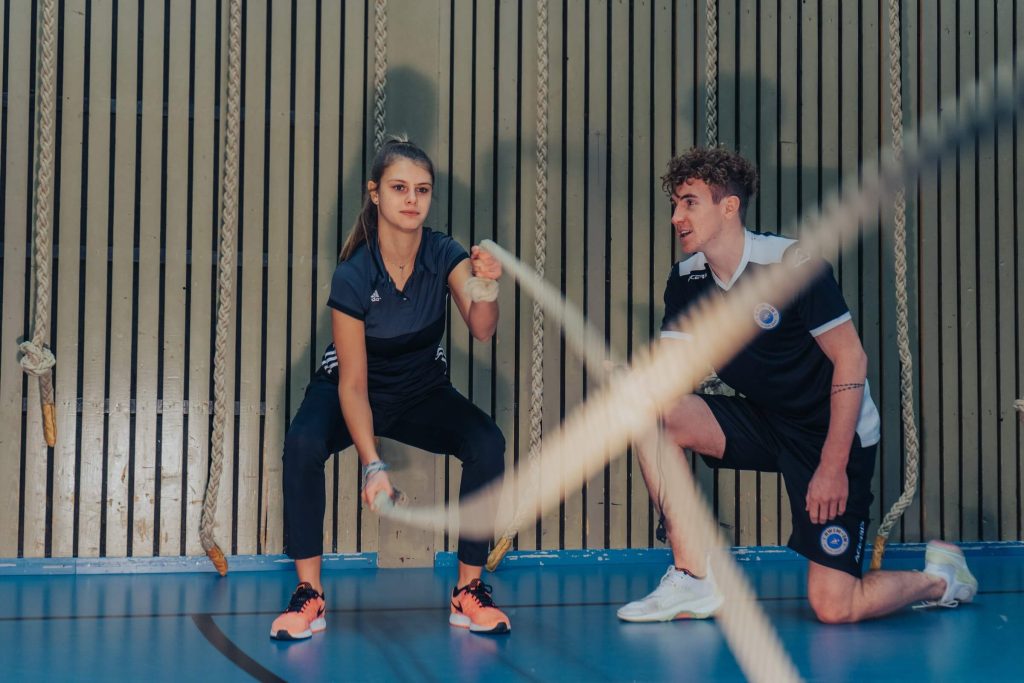High performance coaching is one of the fastest-growing personal trainer niches in the United States. As a workout pro who offers performance coaching services, you could be employed by a variety of organizations, including but not limited to gyms, health clubs, private businesses, and even sports teams.
If you’ve never heard of the performance coach profession before, or you’re wondering if it’s the right path for you, you’ve come to the right place. This article will give you valuable information on what exactly performance coaches do, why the profession has become so popular over the last decade, and how to pursue it as your next career move.
What is Performance Coaching?
Performance coaching is simply helping someone (usually a client) perform better by implementing research-backed strategies. It involves working with individuals to optimize their performance and/or development and get them to the performance levels they seek.
Just as with becoming a successful personal trainer, the process of becoming a successful performance coach varies, and your path won’t exactly match someone else’s. However, done right, performance coaching can have positive outcomes for everyone involved.
One great thing about becoming a high performance coach is that you get to provide professional advice and guidance to bodybuilders and people who wish to improve their health. You will teach clients how to overcome obstacles by instilling new ways of thinking about themselves and others through individual sessions or in groups.
In addition to leading individual or group sessions, effective performance coaches also have to stay on top of the latest trends so they can offer the best possible guidance. That may mean reading books, taking new certification programs, or networking to get information from colleagues.
Although high performance coaches are typically self-employed professionals, they can work with fitness establishments. That means you won’t need to worry about landing your first training client. Instead, you’ll focus on demonstrating your value to organizations that need your help.
How Much Does a Performance Coach Earn?
In case you’re wondering what the median salary of a high performance coach is, here is something for you.
In 2014, Performance Consultants predicted that performance coaching would grow to $1.8 billion by 2017. By 2020, we discovered that those estimates were way off as the industry reached an impressive $7.4 billion (that’s an annual growth rate of 8%).
The median salary for a performance coach is around $60k per year in North America and £40k in Europe. Several coaches earn above this margin by scaling up their businesses, and you can do the same.
How is a Performance Coach Different?

Performance coaches are often trained in not just professional sports but also mental conditioning, and that sets them apart from other coaching professionals. Performance coaching helps counsel athletes to improve their mental fortitude, stay strong under pressure, and channel their training when it counts.
In reality, this can translate to everything from building confidence and improving memory to reducing stress.
What Certification do You Need to Become a Performance Coach?
In most cases, you’ll need a bachelor’s degree in health sciences or a related field to get your foot in the door.
You can take courses curated by other performance coaches to get things started, but if you want to land the big clients, you’ll need to get certified. This will usually be obtained from the certification agency that’s specific to your industry.
It’s also critical to get as much experience as possible, especially if you’re looking to earn the big bucks as a performance coach.
Performance Coaches vs Personal Trainers
Both performance coaches and personal trainers help people improve their health and fitness, but they have very different approaches.
Personal trainers are often required to complete a specific certification, whereas performance coaches require more extensive knowledge of physiology and kinesiology (the study of body movements) in addition to other niche-related certifications to be certified.
Performance coaches also need an education in coaching theory, a strong demonstration of leadership skills, and an unparalleled ability to work with people.
If you’re a personal trainer looking to become a performance coach, don’t let all of that fool you. The odds are that you already have the base skills. You just need to get relevant experience, upskill, and get certified.
How Do you Become a Performance Coach?

Becoming a performance coach can be challenging because of how competitive it is, but it’s certainly within reach, especially for personal trainers who already work closely with clients.
Let’s go over some things to consider when pursuing a performance coaching career.
Get a relevant master’s degree
Unfortunately, no one is going to take you seriously until you have the relevant educational background, so this is a pretty good place to start.
You can complete your master’s while you continue to train clients as a personal trainer. The additional experience and exposure will come in handy.
Get as much experience ASAP
A great strategy here is to intern for an already-established performance coach. This is important because it shows that you are willing to work under someone else to understand how the job works.
Even more importantly, it allows you to get as much insight as possible. You can combine what you learn on a daily basis with your personal trainer skills and immediately start assembling the ultimate performance coaching career.
If your internship goes well, you could even be considered for a full-time position.
Strike out on your own
This is the trickiest part of the whole process because it involves jumping without a safety net and trusting that you’ve learned enough to thrive as a performance coach.
When you feel like you’ve learned enough about the job and have built up sufficient contacts, consider starting your own practice. It may be a good idea to talk to some prospects before you quit, so you can scope the market and see what’s out there.
The more experience you have under your belt and the more connections you have, the easier this ultimate step will be.
Certification courses for Performance Coaches
Performance coaches need a wide range of knowledge to help their clients effectively. Here are some of the courses you should consider taking to improve as a performance coach.
Courses on Nutrition
As a personal trainer, you already know that nutrition is critical to your client’s performance. Taking courses on nutrition on your journey to performance coaching will achieve two things.
One, it will deepen your understanding and allow you to help your clients more easily. But equally important is the fact that nutrition certificates can get you over the line when you’re talking to organizations about performance coaching positions.
Courses on Behavioral Psychology
When it comes to behavior change, you’ll need your clients to kick some bad habits and adopt new, better ones. A strong understanding of behavioral psychology can really come in handy here.
Not only will behavioral psychology courses help you understand how your clients think, they can also give you a solid understanding of behavioral principles while offering action plans on how to apply those principles in life coaching situations.
Courses on Neurolinguistic programming (NLP)
NLP is a fantastic tool for health and wellness coaches. It helps you to understand how people think and use language to influence them. This can come in handy when trying to instill focus and get clients to make lifestyle changes.
The Association for NLP is a great place to start learning more about NLP for free. You can even use the thing you learn to help your current training clients.
How to Find Clients as a Performance Coach

Finding clients as a performance coach is tough for many reasons. For starters, not every organization that needs a performance coach knows they need a performance coach. as a result, there are only so many clients to go around for the booming performance coaching industry.
But guess what? coaches land clients every day, and they use simple and easy-to-follow strategies. Here are four of them.
1. Network with other coaches
Performance coaches tend to know other coaches because they need to refer each other or attend networking events together to build up their businesses. Find out if there is a local chapter of a coaching association, like the National Strength and Coordination Association (NSCA), or the American Association of Professional Coaches (AAPC) in your area and attend meetings regularly.
These groups typically host events where you can meet other performance coaches in person who can then refer work your way once they hear about what you do.
One helpful networking tips is never to approach people seeking referrals off the bat. Instead, focus on building genuine connections and the referrals will come later.
2. Attend seminars and conferences
Most cities have annual fitness conferences where health professionals gather to learn more about fitness trends, products, and research. If you can attend one of these conferences it will allow you to make connections with people who might be able to refer business your way later down the road.
3. Use social media platforms
Social media platforms like Facebook, Twitter, Instagram, etc., are all great places to start when looking for potential clients as a performance coach.
You can post about yourself, what you do, and how others can get in touch with you. You can also use hashtags to see how popular certain topics are so that you can target specific niches.
4. Write articles
Writing articles for sites such as LinkedIn Pulse is a good way to get your name out there and potentially attract new clients as well. Make sure to include links back to your website so that readers interested in hiring you will be able to contact you directly through your site after reading your posts online.
To Wrap It Up
Starting from zero is tough, but it’s not impossible. Once you realize that you want to become a performance coach, it’s a good idea to start increasing your knowledge and getting relevant expeirnce as soon as possible. that way, you put yourself in a better position to succeed. Good luck!
